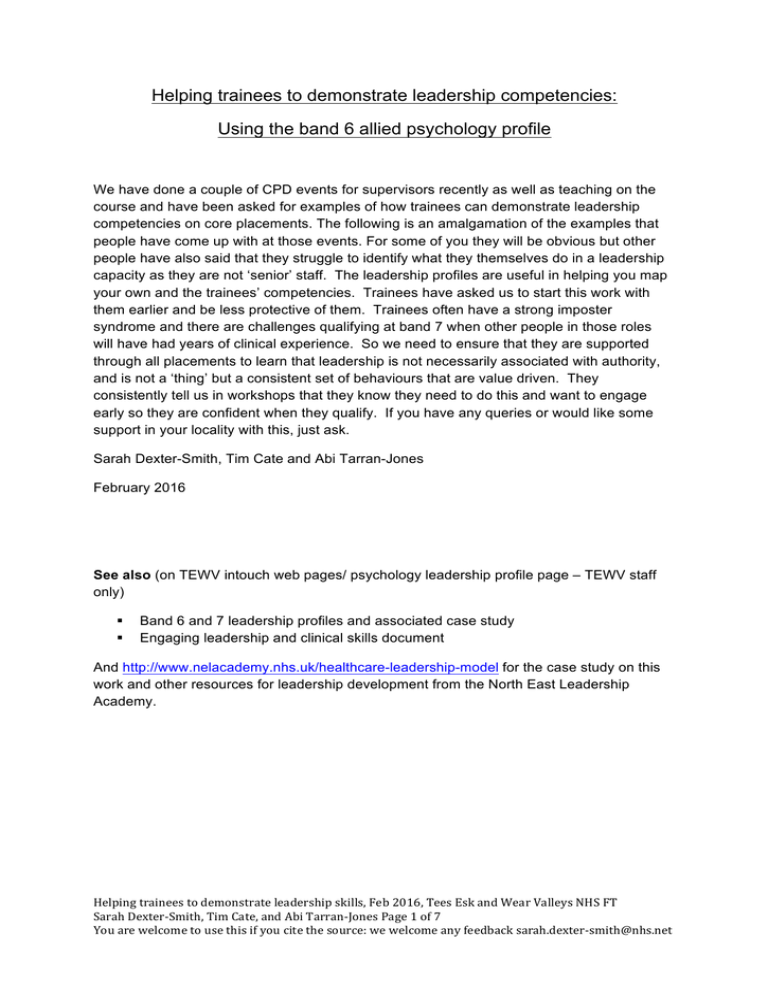examples of ways to support trainees demonstrate competence
advertisement

Helping trainees to demonstrate leadership competencies: Using the band 6 allied psychology profile We have done a couple of CPD events for supervisors recently as well as teaching on the course and have been asked for examples of how trainees can demonstrate leadership competencies on core placements. The following is an amalgamation of the examples that people have come up with at those events. For some of you they will be obvious but other people have also said that they struggle to identify what they themselves do in a leadership capacity as they are not ‘senior’ staff. The leadership profiles are useful in helping you map your own and the trainees’ competencies. Trainees have asked us to start this work with them earlier and be less protective of them. Trainees often have a strong imposter syndrome and there are challenges qualifying at band 7 when other people in those roles will have had years of clinical experience. So we need to ensure that they are supported through all placements to learn that leadership is not necessarily associated with authority, and is not a ‘thing’ but a consistent set of behaviours that are value driven. They consistently tell us in workshops that they know they need to do this and want to engage early so they are confident when they qualify. If you have any queries or would like some support in your locality with this, just ask. Sarah Dexter-Smith, Tim Cate and Abi Tarran-Jones February 2016 See also (on TEWV intouch web pages/ psychology leadership profile page – TEWV staff only) § § Band 6 and 7 leadership profiles and associated case study Engaging leadership and clinical skills document And http://www.nelacademy.nhs.uk/healthcare-leadership-model for the case study on this work and other resources for leadership development from the North East Leadership Academy. Helpingtraineestodemonstrateleadershipskills,Feb2016,TeesEskandWearValleysNHSFT SarahDexter-Smith,TimCate,andAbiTarran-JonesPage1of7 Youarewelcometousethisifyoucitethesource:wewelcomeanyfeedbacksarah.dexter-smith@nhs.net Help them see what they do in clinical settings that is also demonstrating leadership We know from these CPD events that many trainees are already demonstrating leadership skills and behaviours within their core placements. Yet there is a lack of understanding that they are doing so, which means that leadership is often perceived by supervisors and supervisees as separate / specialised skills. This document illustrates the leadership activities that map on to all 11 dimensions of trainee’s core placement competencies (e.g. within the Supervisor Practice Assessment Form). Trainees would benefit from being given the opportunity in supervision to reflect on how their routine activity maps on to the leadership domains. Developing a dialogue about leadership, early on in training, will enable supervisors and supervisees to identify further opportunities to develop leadership skills and prepare trainees for the transition to being newly qualified. Zone of Proximal Development Trainees often have a strong imposter syndrome and there are challenges qualifying at band 7 when other people in those roles will have had years of clinical experience. So we need to ensure that they are supported through all placements to learn that leadership is not necessarily associated with authority, and is not a ‘thing’ but a consistent set of behaviours that are value driven. Make sure you provide enough scaffolding but also make sure you help them see what they are already doing – use the profiles in supervision to guide this discussion. And help them see how they have developed in each placement across the 9 dimensions. In the last placement, start to look at the band 7 profile to help them begin to make this bridge – the jump won’t be as big as you or they might fear. Importance of Visibility, Participation and Accessibility Attending team meetings – Trainees should be encouraged to have a voice/ ask questions/ voice what they see rather than accept the status quo/ learning that speaking in meetings is not just the responsibility of the qualified psychologist. Think about where they will sit and spend most of their day - More trainee visibility leads to more opportunities for other staff to come to them for advice/ for them to contribute to wider projects. Think about revisiting the networks they have built at the end of their placements – is there anyone else they could go and see/ observe. Help them think about some of the more subtle aspects of leadership. Does the way they dress suit their environment and the places they are expected to work? Often this is quite different from one placement / context to another but is not always obvious to trainees. How do their non-verbal cues come over or the language they use – do they present as someone who can be trusted with responsibility, is approachable, can deal with challenges appropriately and is congruent across contexts? Helpingtraineestodemonstrateleadershipskills,Feb2016,TeesEskandWearValleysNHSFT SarahDexter-Smith,TimCate,andAbiTarran-JonesPage2of7 Youarewelcometousethisifyoucitethesource:wewelcomeanyfeedbacksarah.dexter-smith@nhs.net Modelling your Leadership Activity Give them chances to see you ‘leading’ against your profile or to talk to them about situations when they weren’t able to be present. Of course this means you have to notice what you are doing and be able to articulate it and the reasons for choosing to behave in certain ways (or when you chose not to say something). Use modelling, storytelling, reflecting on your own learning etc. Could they map your leadership behaviours against your leadership profile card? Help trainees to think about how other people in leadership positions behave and the impact of those different styles. Do some basic introductory information giving to help them navigate the placement and to give them an organisational framework in which to place later learning. - Go through the trust vision and talk about how your service fits with that Can you discuss the strategy for your specialty/ applied psychology/ your team How do they individually fit within those? Map the stakeholders that impact on your role – when we’ve done it in workshops people are always surprised how vast they are and what opportunities they might provide for trainees to experience different organisations/ cultures etc. Identify / map a team’s training needs (not just deliver a session) Look for ways in which what you already offer them can be done slightly differently to increase the range of competencies they would demonstrate e.g. not just to prepare/ deliver training but to go and engage with the team, ask what they need and then develop the training. Could they then also use data from feedback formally to various stakeholders and think about the language that each audience needs to hear the feedback in? Are there chances to engage in inter-professional learning/ presenting back to the wider team? Strategy / Management / Business Planning Let them attend senior management/ governance/ strategic/ business planning meetings – or ask colleagues if they will take the trainee with them if you don’t attend (are they meetings you might benefit from attending too?) e.g. QuAG, SDG, LMGB, board, business planning cycle meetings. You might think they’ll be bored – trainees have fed back that they were missed opportunities when they weren’t invited to attend. After they’ve been, talk to them about the various styles of leaders that were present at the meeting, how did each style work, how had people been positioned or positioned themselves into the role they had in that meeting? Look over the Healthcare leadership model and see which behaviours the more effective members of the meeting displayed. Helpingtraineestodemonstrateleadershipskills,Feb2016,TeesEskandWearValleysNHSFT SarahDexter-Smith,TimCate,andAbiTarran-JonesPage3of7 Youarewelcometousethisifyoucitethesource:wewelcomeanyfeedbacksarah.dexter-smith@nhs.net Talk to them about the service vision. Help them negotiate national policy and understand the meaning of it for your service (as well as us professionally). Help the trainee to understand the rationale for the ROMs your services uses and to think about useful ways of using them Conflict Management and Feedback Can you talk to them about how you prioritise and negotiate conflict in your workplace and how you provide constructive feedback to colleagues? Helpingtraineestodemonstrateleadershipskills,Feb2016,TeesEskandWearValleysNHSFT SarahDexter-Smith,TimCate,andAbiTarran-JonesPage4of7 Youarewelcometousethisifyoucitethesource:wewelcomeanyfeedbacksarah.dexter-smith@nhs.net Ideas for demonstrating the 9 dimensions for band 6 applied psychologists Inspiring a shared purpose: Essential. Staying true to NHS principles and value Leading formulations/ reflective practice meetings – highlighting to team members the wider impact that an intervention of action that they are doing gives e.g. support work – personal care; wider psychosocial impact and interaction Engaging in reflective practice through supervision Leading with care: Proficient. Recognising underlying reasons for behaviour Staff support Informal supervision Peer supervision Teaching/ training Recognising underlying reasons for behaviour Being empathic to dysfunction within teams and offering solutions. Noticing reactions of staff members e.g. in meeting and following it up/ asking them about it Using supervision to reflect upon personal drivers and using our own countertransference Evaluating Information: Essential. Gathering Data Audit/small scale/ service evaluation Adhering to outcome measures Session rating scale Feedback on future training needs Collecting outcome measures from patients. Using them with the service user collaboratively and sharing the information with staff Helpingtraineestodemonstrateleadershipskills,Feb2016,TeesEskandWearValleysNHSFT SarahDexter-Smith,TimCate,andAbiTarran-JonesPage5of7 Youarewelcometousethisifyoucitethesource:wewelcomeanyfeedbacksarah.dexter-smith@nhs.net Connecting our Service: Essential. Recognising how my area of work relates to other parts of the system Implementing pathways/ supporting others to do so Contributing to MDTs Handing over cases at the end of placement effectively – considering future needs Knowing about onward referral system to other services and how to hand over case with sufficient information Communicating with other professionals who are involved with the person’s care, ensuring working towards the same goals (the patient’s goals) Attending specialty meetings/ QUAGs etc to make sure we’re up to date with service changes Working with other stakeholders during formulation Sharing the vision: Essential. Communicating to credibility and trust Maintaining professionalism while working within team dynamics Supervision Regularly attending and contributing to meetings Providing timely feedback to care co-ordinators Making reports & feedback accessible to whole team / service users – not too much jargon Reading the team dynamics and finding the right time to discuss Communicating risk issues at the appropriate time to the appropriate people e.g. not waiting until supervision. Engaging the Team: Essential. Involving the team Needs assessment for potential teaching Feedback to professionals Being respectful of all opinions in team meetings Naming or challenging a dominant narrative in a team Taking an active role in the team meetings offering professional opinions, challenging perspectives and being an active participant Developing a shared formulation – giving everyone an opportunity to contribute Holding to Account: Essential. Setting clear expectations Helpingtraineestodemonstrateleadershipskills,Feb2016,TeesEskandWearValleysNHSFT SarahDexter-Smith,TimCate,andAbiTarran-JonesPage6of7 Youarewelcometousethisifyoucitethesource:wewelcomeanyfeedbacksarah.dexter-smith@nhs.net Reinforcing expectations around formulation and pathways Collaboratively setting clear goals and actions to be reviewed with both clients and teams Looking at patient needs before trying to find solution. Take responsibility – if therapy not working – adapt – don’t blame client Having a pre-placement meeting and having a discussion about what you want to get out of the placement, self-assessment forms etc Working in accordance with pathways Linking / communicating direct working with wider team/ organisational goals through intervention plans/ CPA/ team meetings Developing Capability: Essential. Providing opportunities for people development Teaching and training Consultation / working through others Supervision Modelling psychological skills Acknowledging needs to improve knowledge Identifying training needs of the team Influencing for Results: Proficient. Adapting my approach to connect with diverse groups Provide opportunities to show learning Informal supervision, ‘tea and chat’. Adapting therapeutic interventions and communication styles (LD/MHSOP etc) using communication aids/ pictures Writing different reports to professionals and clients Delivering training to different staff groups adapting level of communication. Helpingtraineestodemonstrateleadershipskills,Feb2016,TeesEskandWearValleysNHSFT SarahDexter-Smith,TimCate,andAbiTarran-JonesPage7of7 Youarewelcometousethisifyoucitethesource:wewelcomeanyfeedbacksarah.dexter-smith@nhs.net


